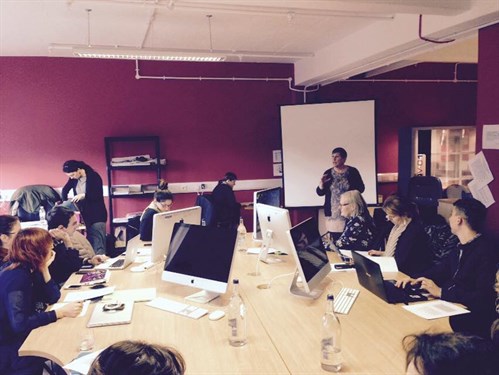 25 trainers, managers and advisers from Italy, Croatia, Slovakia, Estonia and the UK came together recently over three days of meetings and workshops for aspire2create. The aspire2create project is transferring and testing Euro-Aspire, a Competency Framework and Toolkit for trainers working in the non-formal learning sector in the creative industries and arts sectors.
25 trainers, managers and advisers from Italy, Croatia, Slovakia, Estonia and the UK came together recently over three days of meetings and workshops for aspire2create. The aspire2create project is transferring and testing Euro-Aspire, a Competency Framework and Toolkit for trainers working in the non-formal learning sector in the creative industries and arts sectors.
The event was organised to coincide with Collage Arts’ annual Open Studios, which this year attracted over 12,000 visitors and provided the transnational partners with an opportunity to see the Chocolate Factory artists ‘in action’ – as the companies and artists in residence at the Chocolate Factory in Haringey all open their doors once a year to invited visitors and to the public. It also offered an opportunity to showcase the project to visiting stakeholders and to members of the public.

Julie Parish of Rinova working with the aspire2create participants at the transnational ‘Masterclass’. Pictured at the top of the page above: Some of the Masterclass participants at the introductory session.
The meeting and workshops took place between the 12th and 14th November, during which partners explored a number of issues concerned with the use and adaptation of the Euro-Aspire Framework, including the recognition of non-formal learning in the creative industries and questions of terminology, assessment and validation. They also reviewed the use of an on-line Learning Management System which is being tested by the pilot group.
Earlier in the project, the partners conducted a research study concerned with the role of ‘Artistic and Creative Enterprise Advisers’ – those who work to support artists and creative practitioners to start-up and develop enterprises, or the business-side of artistic practices. It found relatively little provision in the partner countries, in terms of business support services specifically for the sector, although there were some examples of good practice which could be transferred. The research also found that critical to the effective performance of the role is the ability to combine a degree of commercial acumen and business know-how with skills, knowledge and experience of the creative sector and to have access to relevant networks in the Creative and Cultural Industries to benefit clients.
As a result of this research and following a recent internal evaluation of the project, aspire2create is now adapting the Euro-Aspire Framework to take into account its findings, as well as some of the emerging needs of the trainers taking part in the project.
Regular updates about the project can be found on the ‘blog’ section of the aspire2create website and also on the project’s Facebook site and its twitter feed.

This project has been funded with support from the European Commission. This communication reflects the views only of the author, and the Commission cannot be held responsible for any use which may be made of the information contained therein.


